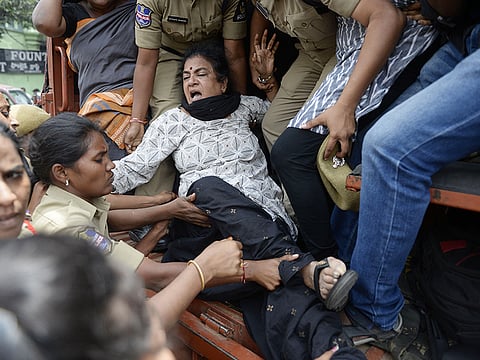Supreme Court orders house arrest for activists
Arrests over links to Maoist guerrillas stokes outrage

New Delhi: India’s Supreme Court on Wednesday directed that the five human rights activists arrested across the country in connection with the Bhima-Koregaon incident in Maharashtra should be kept under house arrest.
An apex court bench headed by Chief Justice Dipak Misra ordered the house arrests on a petition by eminent historian Romila Thapar and four others challenging Tuesday’s detentions.
Taking a dim view of the crackdown, Justice D.Y. Chandrachud said: “Dissent is a safety valve of democracy. If it is not allowed, the pressure cooker will burst.”
He noted that the arrests had taken place nine months after the violence in Maharashtra.
Talking to reporters later, lawyer Prashant Bhushan said the Supreme Court had issued notices to the central and Maharashtra governments.
Those arrested on Tuesday included Varavara Rao in Hyderabad, Gautam Navlakha in Delhi, Sudha Bharadwaj in Haryana and Arun Ferreira and Vernon Gonzalves in Maharashtra.
Their arrests, during raids across the country, for suspected links to Maoist guerrillas ignited allegations on Wednesday that Prime Minister Narendra Modi’s administration was trying to intimidate its critics.
More than 20 civil rights groups, lawyers forums and trade unions are launching a campaign against Tuesday’s crackdown, describing it as Modi’s latest attempt to stifle dissent and shore up his standing in the run-up to elections in 2018.
Police also accused the five of inflammatory speeches at a rally in western India last year which led to violent clashes between Dalits, the lowest in the Hindu caste hierarchy, and right wing organisations.
Laptops, mobile phones and even passwords were taken away during the raids at her home said trade union activist Sudha Bharadwaj who has been fighting for the rights of workers in parts of India such as Chhattisgarh where left-wing guerrilla groups operate.
“The effort is whatever is the opposition to this regime, whether it is workers rights, tribal rights, everybody who in the opposition is being rounded up,” she told reporters outside her home in Faridabad, a short distance from New Delhi.
The arrests follow months of tensions between right wing nationalist groups and advocates of free speech that has played out in college campuses and spilled over into the streets.
Critics also say several top journalists have been forced out of their jobs for their critical reporting of the government.
Police said they would be producing Bharadwaj and the four other activists arrested later on Wednesday. The others were Varavara Rao, a prominent poet from the southern city of Hyderabad, activists Vernon Gonsalves and Arun Ferreira from Mumbai and civil liberties activist Gautam Navlakha from New Delhi.
“The accused are booked under the unlawful activities prevention act,” said a police officer in the western city of Pune.
He said the main case relates to a rally held there on December 31, 2017 commemorating the valour of Dalits where provocative speeches were delivered. The following day, violent clashes broke out between members of the lower caste and hardline Hindu groups.
The police officer, who could not be named because he was not authorised to speak to reporters, said police had seized documents relating to the Maoist guerrillas who are leading an armed battle for the rights of the landless in large parts of eastern and southern India called the Red Corridor.
Rahul Gandhi, the leader of the main opposition Congress party, said the latest raids showed that the government had little tolerance for activists, except for right wing groups that shared its hardline ideology.
“Shut down all other NGOs. Jail all activists and shoot those that complain. Welcome to the new India,” he said in a Twitter post. Rights groups said they would be holding protest marches in New Delhi and Mumbai.



